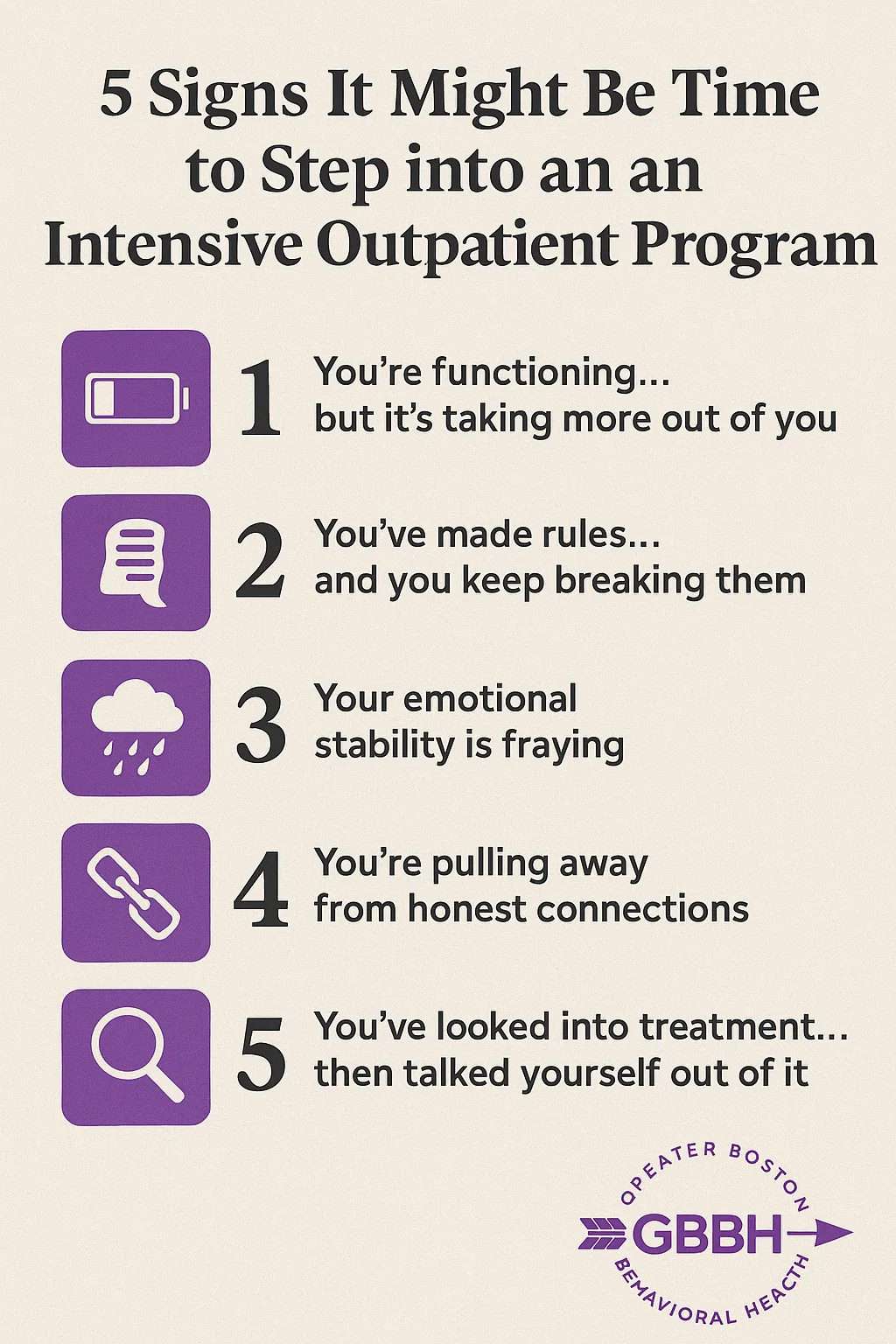Some people hit rock bottom. Others hit burnout. There’s no dramatic crash, no public fallout—just a quiet, steady decline you can’t shake off. You’re productive, you meet your deadlines, you’re there for your family… but it feels harder than it should. The high-functioning addict or alcoholic isn’t falling apart on the outside—they’re crumbling on the inside.
If you’ve ever caught yourself thinking, “I’m not bad enough for treatment,” this is for you. You don’t have to wait for things to collapse before you reach out. An intensive outpatient program in Boston, MA could be the safety net you didn’t know you needed.
Let’s walk through five subtle but serious signs that it might be time to consider IOP—and why acting early can be one of the smartest decisions you’ll ever make.
1. You’re Functioning… But It’s Taking More Out of You
Outwardly, you’re checking all the boxes: showing up to work, handling responsibilities, keeping relationships intact. But every day feels like pushing a boulder uphill. You wake up already depleted, your fuse is shorter, and the cracks are starting to show behind closed doors.
Maybe it used to be easy to “reset” after a rough night or a stressful week. Now, the bounce-back time is longer. The recovery periods feel like quicksand. If you feel like you’re barely maintaining the image of having it together, it’s a red flag.
IOP doesn’t demand that you quit your life—it helps you build a better one while keeping your career, family, and privacy intact. It’s designed to catch people before the fall.
2. You’ve Made Rules… And You Keep Breaking Them
One of the biggest signals that your relationship with substances is shifting is when you keep moving your own goalposts.
- “I’ll only drink on weekends.” Then it’s Thursday, then Wednesday.
- “I’ll never drink before noon.” Then it’s a mimosa at brunch… then a quick drink before a meeting.
- “I’ll stop after two.” Then it’s three, four, or you lose count.
These quiet negotiations with yourself—followed by quiet failures—don’t make you weak. They make you human. But they’re also a strong indicator that your coping mechanisms aren’t working anymore. And that’s exactly what an intensive outpatient program is built to help with: addressing the cycle before it spirals.
3. Your Emotional Stability Is Fraying
When people think of addiction, they imagine slurred words and reckless behavior. They rarely think about the quieter symptoms: the unexplained anxiety, the quick temper, the waves of guilt after snapping at loved ones.
Maybe you’ve noticed that you’re more irritable, that your patience runs thinner, or that small tasks feel overwhelming. Maybe sleep has become unpredictable—too much some days, restless and broken on others. Emotional burnout is often the first real consequence of prolonged high-functioning substance use.
An intensive outpatient program teaches you how to manage emotions in healthier ways—through therapy, coping skills, and group support. It’s not just about removing substances. It’s about restoring stability where you’ve been white-knuckling through the day.
4. You’re Pulling Away from Honest Connections
One of the more painful signs of internal struggle is isolation—not because others reject you, but because you slowly avoid those who truly see you.
You skip the friend who might notice your drinking’s escalated. You ghost the cousin who asks if you’re okay. You dodge situations where your consumption would be obvious or questioned.
High-functioning addicts often master hiding in plain sight. But the cost is rising loneliness, fractured relationships, and increasing shame.
IOP offers a counterbalance: a community of peers and clinicians where you can be honest without judgment. You don’t have to explain away your struggles—you can work through them openly and constructively.
5. You’ve Looked Into Treatment… Then Talked Yourself Out of It
If you’ve found yourself researching IOP programs, reading about treatment options, or wondering if you “qualify” for help—you’re already further along than you realize. That little voice inside that says, “Maybe I should do something,” deserves attention.
Many high-functioning people convince themselves they’re not sick enough, not desperate enough, not failing enough. The truth is, the earlier you seek support, the faster and smoother the recovery process can be. IOP helps you regain control before serious consequences stack up—whether legal, professional, or personal.
At Greater Boston Behavioral Health, we specialize in supporting high-functioning individuals who are ready to make proactive changes, without blowing up their life in the process.
Why Choose an Intensive Outpatient Program?
Choosing IOP means you don’t have to leave your job, your family, or your daily life. You attend structured therapy sessions multiple times a week, either in the day or evening, so you can continue living while doing the work of recovery.
This level of care offers:
- Group therapy to break isolation and normalize your experience
- Individual therapy to address root causes and triggers
- Skills training to manage stress, cravings, and difficult emotions
- A flexible structure that supports growth without disrupting your life
Looking for an intensive outpatient program in Boston, MA? Greater Boston Behavioral Health is here to help you step into real change—on your terms. If you’re local to Newton, Dedham, Needham, Wellesley, or Boston, Massachusetts, GBBH offers help that meets you exactly where you are.
Frequently Asked Questions About Intensive Outpatient Programs (IOP)
What exactly is an intensive outpatient program (IOP)?
An IOP is a structured treatment program designed for people who need more support than weekly therapy but don’t require 24/7 inpatient care. It typically involves attending therapy sessions several days per week while continuing to live at home and manage daily responsibilities.
How do I know if IOP is right for me?
If you’ve noticed changes in your behavior, broken your own substance-use rules, or feel emotionally unstable despite keeping life together on the outside, IOP could be a good fit. It’s ideal for people who want professional support without needing full hospitalization.
Do I have to stop working to attend IOP?
No. Most IOPs, including those at Greater Boston Behavioral Health, offer flexible scheduling with day and evening options so you can keep working while attending treatment.
Is IOP only for addiction?
Not at all. While IOP is effective for treating substance use, it’s also widely used for mental health challenges like anxiety, depression, trauma, and stress management. Many people enter IOP to improve overall well-being, not just to stop using.
How long does an IOP program last?
Programs vary, but most IOPs last 6 to 12 weeks, depending on individual needs. At Greater Boston Behavioral Health, we personalize your treatment plan based on your goals and progress.
You don’t need to hit rock bottom to get help. You just need to be tired of living like this.
Call (888) 450-3097 or visit to learn more about our intensive outpatient program services in Boston, Massachusetts. Find your turning point—without waiting for disaster.


